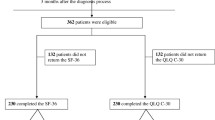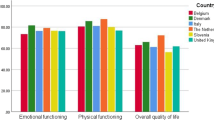Abstract
Purpose
This study explores what dimensions of a health-related quality of life (HRQOL) questionnaire predict global ratings of overall quality of life (QOL) in lung cancer patients in assessments by patients and significant others, respectively.
Material and methods
The analyses were based on dyadic assessments from lung cancer patients and their significant others. A subset of scales and items from the Swedish version of the European Organization for Research and Treatment of Cancer (EORTC) QLQ C30 and the lung-cancer-specific module, LC-13, was selected. Using multiple regression procedures, the relative importance of different symptoms and of functional impairments in predicting overall QOL was examined.
Results
The multiple regressions revealed that emotional functioning and fatigue were the only significant predictors of overall QOL for both the patients and the significant others’ assessments. In addition, physical functioning was found to be another predictor in the significant others’ assessments.
Conclusion
The results emphasize that it is essential to consider both emotional functioning and fatigue as important areas for overall QOL in lung cancer patients.
Similar content being viewed by others
References
Aaronson NK, Ahmedzai S, Bergman B, Bullinger M, Cull A, Duez NJ, Filiberti A, Flechtner H, Fleishman SB, de Haes JC et al (1993) The European Organization for Research and Treatment of Cancer QLQ-C30: a quality-of-life instrument for use in international clinical trials in oncology. J Natl Cancer Inst 85:365–376
Albrecht GL, Devlieger PJ (1999) The disability paradox: high quality of life against all odds. Soc Sci Med 48:977–988
Arnold R, Ranchor AV, Sanderman R, Kempen GI, Ormel J, Suurmeijer TP (2004) The relative contribution of domains of quality of life to overall quality of life for different chronic diseases. Qual Life Res 13:883–896
Beckles MA, Spiro SG, Colice GL, Rudd RM (2003) Initial evaluation of the patient with lung cancer: symptoms, signs, laboratory tests, and paraneoplastic syndromes. Chest 123:97S–104S
Bergman B, Aaronson NK, Ahmedzai S, Kaasa S, Sullivan M (1994) The EORTC QLQ-LC13: a modular supplement to the EORTC Core Quality of Life Questionnaire (QLQ-C30) for use in lung cancer clinical trials. EORTC Study Group on quality of life. Eur J Cancer 30A:635–642
Bowling A (2005) Just one question: if one question works, why ask several? J Epidemiol Community Health 59:342–345
Boyle P, Ferlay J (2005) Cancer incidence and mortality in Europe, 2004. Ann Oncol 16:481–488
Cella D (2004) Quality of life considerations in patients with advanced lung cancer. Semin Oncol 31:16–20
Cooley ME (1998) Quality of life in persons with non-small cell lung cancer: a concept analysis. Cancer Nurs 21:151–161
Cooley ME (2000) Symptoms in adults with lung cancer: a systematic research review. J Pain Symptom Manage 19:137–153
Dunner DL (1996/97) Affective disorders: clinical features. In: Michels R, Cooper AM, Guze SB, Judd LL, Solnit AJ, Stunkard AJ, Weissman MM, Wilner PJ (eds) Psychiatry. Lippincott-Raven, Philadelphia
Fayers PM, Machin D (2000) Quality of life: assessment, analysis and interpretation. Wiley, Chichester
Flechtner H, Bottomley A (2003) Fatigue and quality of life: lessons from the real world. Oncologist 8:5–9
Heinonen H, Aro AR, Aalto AM, Uutela A (2004) Is the evaluation of the global quality of life determined by emotional status? Qual Life Res 13:1347–1356
Lazarus RS (1985) The psychology of stress and coping. Issues Ment Health Nurs 7:399–418
O’Boyle CA, Waldron D (1997) Quality of life issues in palliative medicine. J Neurol 244:18–25
Ormel J, VonKorff M, Ustun TB, Pini S, Korten A, Oldehinkel T (1994) Common mental disorders and disability across cultures. Results from the WHO collaborative study on psychological problems in general health care. JAMA 272:1741–1748
Payne SA (1992) A study of quality of life in cancer patients receiving palliative chemotherapy. Soc Sci Med 35:1505–1509
Rapley M (2003) Quality of life research: a critical introduction. SAGE, London
Sloan JA, Aaronson N, Cappelleri JC, Fairclough DL, Varricchio C (2002) Symposium on quality of life in cancer patients. Assessing the clinical significance of single items relative to summated scores. Mayo Clin Proc 77:479–487
Spilker B, Revicki A (1996) Taxonomy of quality of life. In: Spilker B (ed) Quality of life and pharmacoeconomics in clinical trials. Lippincott-Raven, Philadelphia
Tang ST, McCorkle R (2002) Use of family proxies in quality of life research for cancer patients at the end of life: a literature review. Cancer Investig 20:1086–1104
Tishelman C, Degner LF, Rudman A, Bertilsson K, Bond R, Broberger E, Doukkali E, Levealahti H (2005) Symptoms in patients with lung carcinoma: distinguishing distress from intensity. Cancer 104:2013–2021
Wennman-Larsen A, Tishelman C, Wengstrom Y, Gustavsson P (2007) Factors influencing agreement in symptom ratings by lung cancer patients and their significant others. J Pain Symptom Manage 33:146–155
WHO (1990) Cancer pain relief and palliative care. Report of a WHO expert committee. WHO Tech Rep Ser 804:1–75
WHOQOLGroup (1993) Study protocol for the World Health Organization project to develop a quality of life assessment instrument (WHOQOL). Qual Life Res 2:153–159
Wilson IB, Cleary PD (1995) Linking clinical variables with health-related quality of life. A conceptual model of patient outcomes. JAMA 273:59–65
Winningham ML, Nail LM, Burke MB, Brophy L, Cimprich B, Jones LS, Pickard-Holley S, Rhodes V, St Pierre B, Beck S et al (1994) Fatigue and the cancer experience: the state of the knowledge. Oncol Nurs Forum 21:23–36
Acknowledgment
This study was supported by grants from the Health Care Sciences Post-Graduate School at Karolinska Institutet, Sweden. The study on factors influencing agreement in symptom ratings from which data has been used was supported by grants from the Swedish Cancer Society and the Swedish Foundation for Health Care Sciences and Allergy Research. Special thanks are due to the Swedish Cooperative Union for generously donating gift vouchers to the participating patients and significant others. We also thank Professor Carol Tishelman for sharing data from lung cancer patients derived from a study financed by the Swedish Cancer Society, the Swedish Heart–Lung Society, the Swedish National Research Council, and the Swedish Foundation for Health Care Sciences and Allergy Research.
Author information
Authors and Affiliations
Corresponding author
Rights and permissions
About this article
Cite this article
Östlund, U., Wennman-Larsen, A., Gustavsson, P. et al. What symptom and functional dimensions can be predictors for global ratings of overall quality of life in lung cancer patients?. Support Care Cancer 15, 1199–1205 (2007). https://doi.org/10.1007/s00520-007-0239-6
Received:
Accepted:
Published:
Issue Date:
DOI: https://doi.org/10.1007/s00520-007-0239-6




